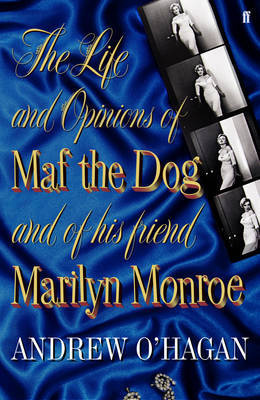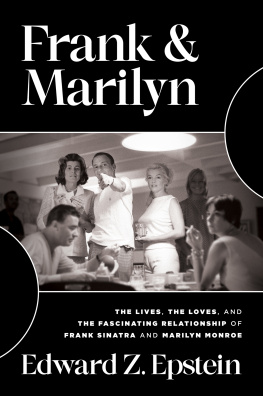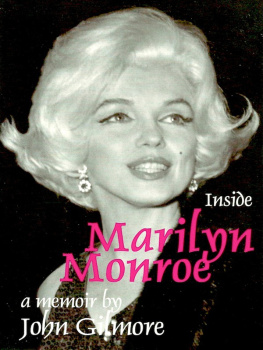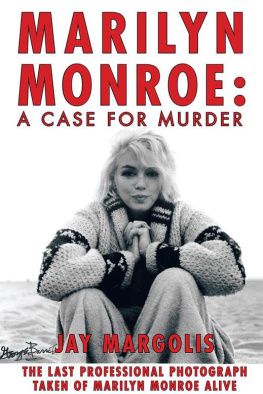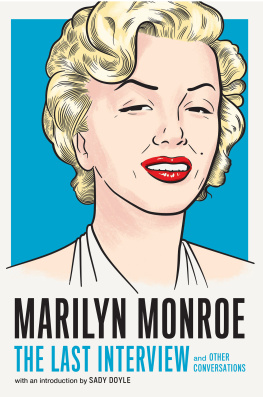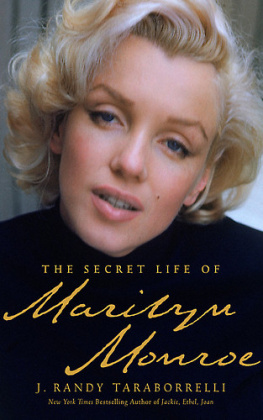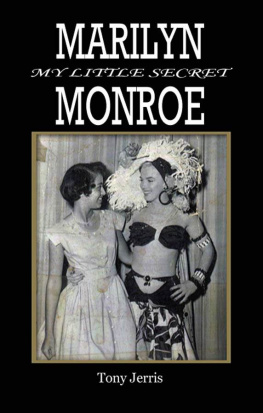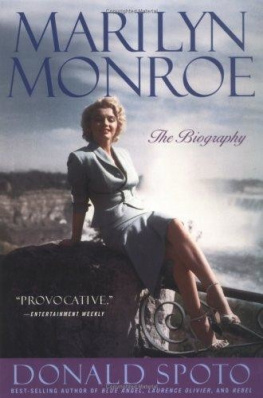ADVANCE READING COPY NOT FOR RESALE
Its brilliant, the novel, a joy to read. Moving, and very funny and sad. Maf is wonderful. And so is Marilyn. Roddy doyle
The Life and Opinions of Maf the Dog is a miracle and will become a classic. I loved, loved it. If only Marilyn Monroe were alive to read it. ednA oBRIen
This is one of those rare books, written with such sureness of pace and lightness of touch that you find you have read a hundred pages without looking up. ColM TIBn
In november 1960, Frank Sinatra gave Marilyn Monroe a dog. His name was Mafia Honey, or Maf for short. He had an instinct for celebrity. For politics. For psychoanalysis. For literature. For interior decoration.
With style, brilliance, and panache, Andrew oHagan has drawn an altogether original portrait of the woman behind the icon, and the dog behind the woman.
Heres Mafia Honey on... MARIlyn MonRoe: The Marilyn I knew was smelly and fun and an artist to the very end of her fingertips.
FRAnk SInATRA: everything appeared to melt into a shrug, but it was all appearance: Mr. Sinatra was actually the least relaxed person I ever met.
nATAlIe Wood: It was as if someone had gently turned up the setting on an icebox, her eyes sparkling a wee bit harder as she turned a few degrees cooler.
ANDREW OHAGAN was born in Glasgow, Scotland. His previous novels have been awarded the Los Angeles Times Book Prize, the James Tait Black Memorial Prize, and the e. M. Forster Award. He has also published essays, reportage, and stories in the London Review of Books, the New York Review of Books, Granta, and The New Yorker.
Cover design and illustration by kimberly Glyder Author appearances Promotional book trailer
National advertising, including the New York Review of Books >>Publication date: December 6, 2010 <<
Publicity contact: Summer Smith 212-420-5878 summer.smith@hmhpub.com ISBN 978-0-15-101372-2 $24.00 288 pages 6 9
UNCORREC T ED PROOF
Jacket scans and press materials are available at www.hmhbooks.com
the life and opinions of maf the dog, and of his friend marilyn monroe books by
andrew ohagan
The Missing
Our Fathers
Personality
Be Near Me
The Life and Opinions of Maf the Dog, and of His Friend Marilyn Monroe
Andrew OHagan
houghton mifflin harcourt boston new york
2010
First U.S. Edition
Copyright 2010 Andrew OHagan
all rights reserved
For information about permission to reproduce selections from this work, write to Permissions, Houghton Mifflin Harcourt Publishing Company, 215 Park Avenue South, New York, New York 10003.
www.hmhbooks.com
First published in Great Britain by Faber and Faber Ltd., 2010
Library of Congress Cataloging-in-Publication Data TK
isbn 978-0-15-101372-2
Printed in the United States of America
doc 10 9 8 7 6 5 4 3 2 1
In memory of Margery and Betsy Faith is the argument of non-evident truths. rabelais
M
y story really begins at Charleston, a perfect haunt of light and invention that stands in the English countryside. It was warm that summer and the mornings went far into the afternoon, when the best of the garden would come into the house, the flowers arranged in pots and given new life by Vanessa in her fertile hours. She was always there with her oils and her eyes, the light falling through the glass ceiling to inflame the possibility of something new. She had good days and bad days. On good days she set out her brushes and knew the time was right for work when all her memories became like an aspect of sleep.
It was June 1960. The gardener had just brought a tray of foxgloves into the kitchen, the flowers pert but deafened after a week or two of bees. I was sitting in a basket next to the oven when a ladybird crawled over the table. Hes got the knock, innee? said the insect, climbing over a breadcrumb.
Hes just tired, I said. He needs a cup of tea.
Mr Higgens swiped the soil off the table and the poor creature, too. Bloody slummocky in here, he said. Grace! Where you want them?
People have no head for miracles. They are pressed into shape by the force of reality, a curse if you ask me. But never mind: I was lucky to have my two painters, Vanessa Bell and Duncan Grant, a pair who, for all their differences, shared a determination to dream the world they lived in and fashion it into permanence. And what a blessing it was to paddle about on those Sussex flagstones and chase the yellow wasps, turning slowly into lovely me, the sort of dog who is set for foreign adventures and ordained to tell the story.
There are several things every civilised person ought to know about your average dog. The first is that we love liver and think its a zizz and a yarm and a rumph and a treat, especially when it comes with sausage. The second is that we usually hate cats, not for the typical reasons, but because they show an exclusive preference for poetry over prose. No cat ever spoke for long in the warmth of good prose. A dogs biggest talent, though, is for absorbing everything of interest
we absorb the best of what is known to our owners and we retain the thoughts of those we meet. We are retentive enough and we have none of that fatal human weakness for making large distinctions between what is real and what is imagined. It is all the same, more or less. Nature provides a nice example, but it is no longer the place where men live. They live in a place they invented with their own minds.
This day, my siblings and I were to be found crowded around three dishes on the kitchen floor, while Grace Higgens stood at the table with flour up to her elbows. She was giving voice to all manner of nonsense about her holiday in Roquebrune, which wasnt really a holiday. Grace was clever: she imagined the animals were listening to every word she said and she even grew embarrassed if she said something foolish, which was not only endearing but quite wise. The loudest of the people in the dining room was certainly Mr Connolly, the literary critic, who was visible to us beyond an expanse of sisal carpet and a lilac armchair, the great man munching olives and inhaling dark wine like it was going out of fashion. He made a pinched face every time he drank from his glass.
You hate the wine, Cyril, Mrs Bell said. Why dont you ask
Grace to bring one of the better things from downstairs? Even during the War, Mr Grant said, Cyril always knew
where to find a decent bottle of wine. Yes, he could always
find wine. And paper for his angry little magazine. I licked Mrs Higgenss elbow when she put me on the
table. She made a jolly sound and bent down to look at her
reflection in the kettle and primp her hair. Id say youre
a terrible charmer, she said. A right one for the charm,
eh? Not as clever as that last litter. My. That lot were the
cleverest dogs. You hadnt seen clever until you saw those
dogs. What? A lovely group. You could just tell they came
from good people. Walter said it himself. Yes, he did. A credit
to the breed he said. The beautiful eyes they had on them.
Like most people who dont say much, Walter was always
being quoted for what he did say. She touched my nose. But
you are the pretty one. Yes you are. The pretty one. Mmmhmmm. And America! Youll be too good for us once youre
in America!
Mrs Higgens kept the whole thing together, cooking and
cleaning, and of course its a great thing to be among talented
people, but all the hurly-burly of their extravagant natures
and their sexual lives and everything appeared to quite
exhaust Mrs Higgens. Just thinking about what went on in
their minds made her want to go for a lie down. Of course
she wasnt scared to have her say and when she lifted me
onto the table I spied immediate evidence of her tendency to complain: her wee brown diary sitting there open and quite proud of itself. It was Mrs Higgens who gave me sympathy for the household gods; here she was, this experienced rinser of garments, this Helen of failed cakes, who might have ruined her eyes during forty years of enabling those artists to be free. She sat down, wiped the rim of her teacup, and lifted the book. On the inside cover it said, Grace Higgens, Charleston, Firle, Nr. Lewes. As she flicked through the pages she was living all that life over again, what wasnt there as much as what was. * The laughter coming from the dining room seemed an adequate accompaniment to the smell of
Next page
